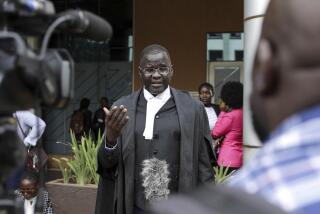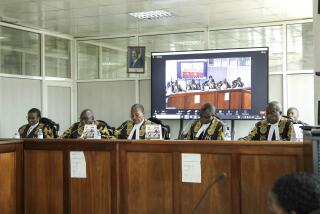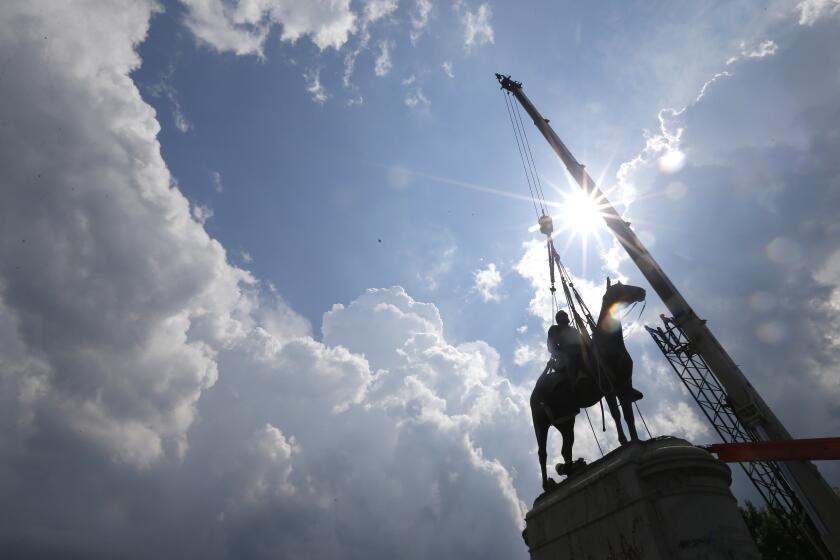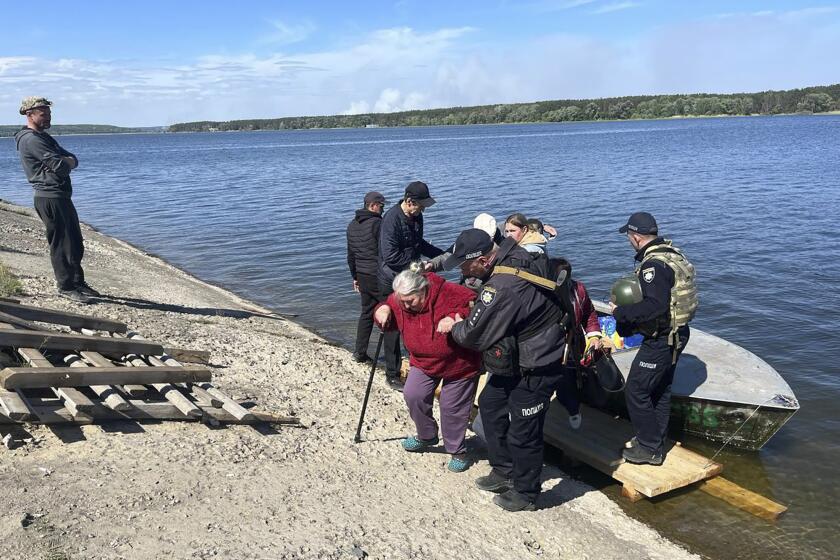Hawaii Ruling Lifts Ban on Marriage of Same-Sex Couples
Hawaii, known for its progressive social streak, became the first state in the nation to legalize marriage between same-sex couples Tuesday when a judge ruled that banning such unions is unjustified discrimination.
“We hope to get married in the next couple of days,” said an elated Joseph Melillo, who brought suit with his partner, Patrick Lagon, and two lesbian couples. “It’s a very strong decision.”
In his opinion, Hawaii Circuit Judge Kevin S.C. Chang said that the state had failed to prove it had a compelling interest in preventing such marriages. He issued an injunction to prevent the state Department of Health from denying licenses solely because applicants are of the same sex, basing his reasoning on the equal protection clause of the state Constitution.
Deputy Atty. Gen. Rick J. Eichor, however, said no marriage licenses will be issued immediately because he will ask Chang to suspend his decision until it can be appealed to the state Supreme Court, which had sent the case to the circuit court for trial, imposing a strict burden of proof on the state.
“We’ll know in a few days whether the licenses will be issued,” predicted plaintiffs’ attorney Daniel R. Foley. If the request for a stay is denied by Chang and the high court, “there’s a very good chance we would have same-sex marriage this year.”
Although the legal battle is far from over, gay rights advocates hailed Tuesday’s decision as a momentous one.
“This is the first court in the United States that has ever said it is unconstitutional to deny gay men and lesbians the right to marry,” said Matt Coles, director of the Lesbian and Gay Rights Project of the American Civil Liberties Union.
“It’s the first time a respected, important institution has . . . acknowledged that lesbian and gay relationships are functionally the equivalent of heterosexual relationships,” he continued. “We have a long way to go to get the rest of the country to see that. But this is an important step.”
Conservative opponents condemned the opinion as an outrageous example of a court thumbing its nose at public opinion.
“This is a slap in the face of the Hawaiian people and Americans everywhere,” said Robert H. Knight, director of cultural studies at the Family Research Council in Washington.
“Once again an activist judge has flouted public opinion and a perfectly reasonable law and imposed his own agenda,” Knight complained, predicting that the court action will give new impetus to efforts to bar recognition of Hawaii same-sex marriages elsewhere in the country.
Fears that Hawaii would legalize same-sex marriage have launched a wave of preemptive legislation nationwide. The Defense of Marriage Act, signed by President Clinton in September, denies federal benefits to same-sex couples and allows states to ignore the unions.
Legislation banning same-sex marriages was introduced in 37 states over the past year, according to gay rights groups. Sixteen states passed the proposals and in another two, same-sex marriage prohibitions were adopted through executive order.
In California, an anti-gay marriage bill passed the Republican-led Assembly but died in the Democrat-controlled Senate. Even though Democrats strengthened their hand in the November election, winning the Assembly, the sponsor of last session’s bill said he will try again next year.
“This cuts across both parties when you talk about redefining marriage,” said Republican Pete Knight of Palmdale, who was in the Assembly last session but was just elected to the Senate.
“We’re taking the one-man, one-woman out of the definition of marriage,” said Knight, warning that would open marriage to unwanted variations. “If you redefine it based on a loving, committed relationship and that’s your criteria, how do you stop, from a legal standpoint, three people getting married?”
Jon Davidson, a staff attorney with the Lambda Legal Defense and Education Fund--which was co-counsel in the Hawaii case--scoffed at the argument. “The reality is it doesn’t open the door to any of those things. This case was about sex discrimination.”
Although polls show that Hawaii residents oppose gay marriages by a 70% margin, the state is known for its live-and-let-live atmosphere and for being on the cutting edge of social issues. It was the first state to pass the Equal Rights Amendment and to pass a law allowing abortion. In 1991, it outlawed discrimination against homosexuals in employment.
“Hawaii has had a tradition,” Foley pointed out Tuesday, “of protecting civil liberties more broadly than they are protected by the U.S. Constitution and the U.S. Supreme Court.”
In his decision, Chang picked apart the testimony of the expert witnesses called by the state, highlighting where they had actually supported the plaintiffs’ case.
“There certainly is a benefit to children which comes from being raised by their mother and father in an intact and relatively stress-free home,” he wrote. “However, there is a diversity in the structure and configuration of families” today, including single parents, stepparents, adoptive parents and gay and lesbian parents.
“The evidence presented by [the] plaintiffs and defendant establishes that the single most important factor in the development of a happy, healthy and well-adjusted child is the nurturing relationship between parent and child,” he concluded.
Leina’ala Pregil, 19, daughter of one of the lesbian couples who filed suit, burst into tears when she heard the news Tuesday. “I am so happy,” she said. “A lot of kids grow up with parents who don’t care for them. I have two parents who love me and care for me and support me.”
The case began six years ago when Melillo and Lagon and two lesbian couples--Antoinette Pregil and Tammy Rodrigues, and Ninia Baehr and Genora Dancel--stepped up to the counter at the Health Department to request marriage licenses. As expected, their applications were denied.
The couples appealed their case to the state Supreme Court, whose 1993 ruling ignited an emotional debate in legislatures and living rooms across the country. The justices found that denying same-sex couples the right to marry violated the equal protection clause of the Hawaii Constitution, unless the state could prove such discrimination was justified.
The high court’s rationale rested not on the couples’ sexual orientation but on their sex. The applicants, the court noted, were treated differently from other couples lined up at the counter simply because of their gender. It sent the case back to the circuit court for trial, putting the highest burden of proof on the state. Few legal experts expected the state to be able to meet it.
To prevail, the state had to persuade Chang that denying marriage licenses to same-sex couples is a narrowly drawn restriction on their freedom that is of “compelling interest” to society as a whole. The case is known as Baehr vs. Miike--Lawrence Miike being the defendant in his capacity as state health director.
The crux of the state’s case presented at the September trial was that children deserve to be raised by their mother and father, and same-sex couples offer, at most, only one biological parent. Children do best in intact families with both a male and female role model, the state said, and the marriage law merely seeks to put the odds in favor of the child.
But the judge noted that the evidence showed that same-sex couples who choose to have children prove to be just as fit as parents in more traditional families.
“[The] defendant has failed to establish a causal link between allowing same-sex marriage and adverse effects upon the optimal development of children,” the judge wrote in his 46-page decision. Allowing same-sex marriage, he said, may actually help the children now being raised by gay and lesbian couples by giving them the protections and benefits that come with marriage--which could include tax, inheritance and health insurance provisions.
Eichor will appeal the case to the Hawaii Supreme Court. Three of the five justices now sitting on the court concurred in the decision that remanded the case to circuit court for trial.
Hawaii voters will get a crack at the issue at a state constitutional convention, the date for which has not been set. In the meantime, opponents of same-sex marriage will keep pushing at the Legislature, hoping to derail the court case with a state constitutional amendment banning such unions.
“This is a blessing in disguise,” said Mike Gabbard, chairman of the Alliance for Traditional Marriage. “It’s going to further our resolve in getting a constitutional amendment passed.”
The Rev. Lou Sheldon of the Anaheim-based Traditional Values Coalition agreed that the pressure now is on the Hawaii Legislature. “Just because we’ve lost this battle doesn’t mean the war is over,” he said. “We have just begun to fight.”
Should such efforts fail, the legal battle will shift to the mainland, when gay couples married in Hawaii return to their home states and press for official recognition of their unions and the benefits that go with it.
“Lambda is going to be very busy for a while,” Davidson said of his organization, a national gay legal group that has been a major player in the marriage debate.
Essoyan, a Times special correspondent, reported from Hawaii and staff writer Boxall from Los Angeles.
More to Read
Start your day right
Sign up for Essential California for news, features and recommendations from the L.A. Times and beyond in your inbox six days a week.
You may occasionally receive promotional content from the Los Angeles Times.







